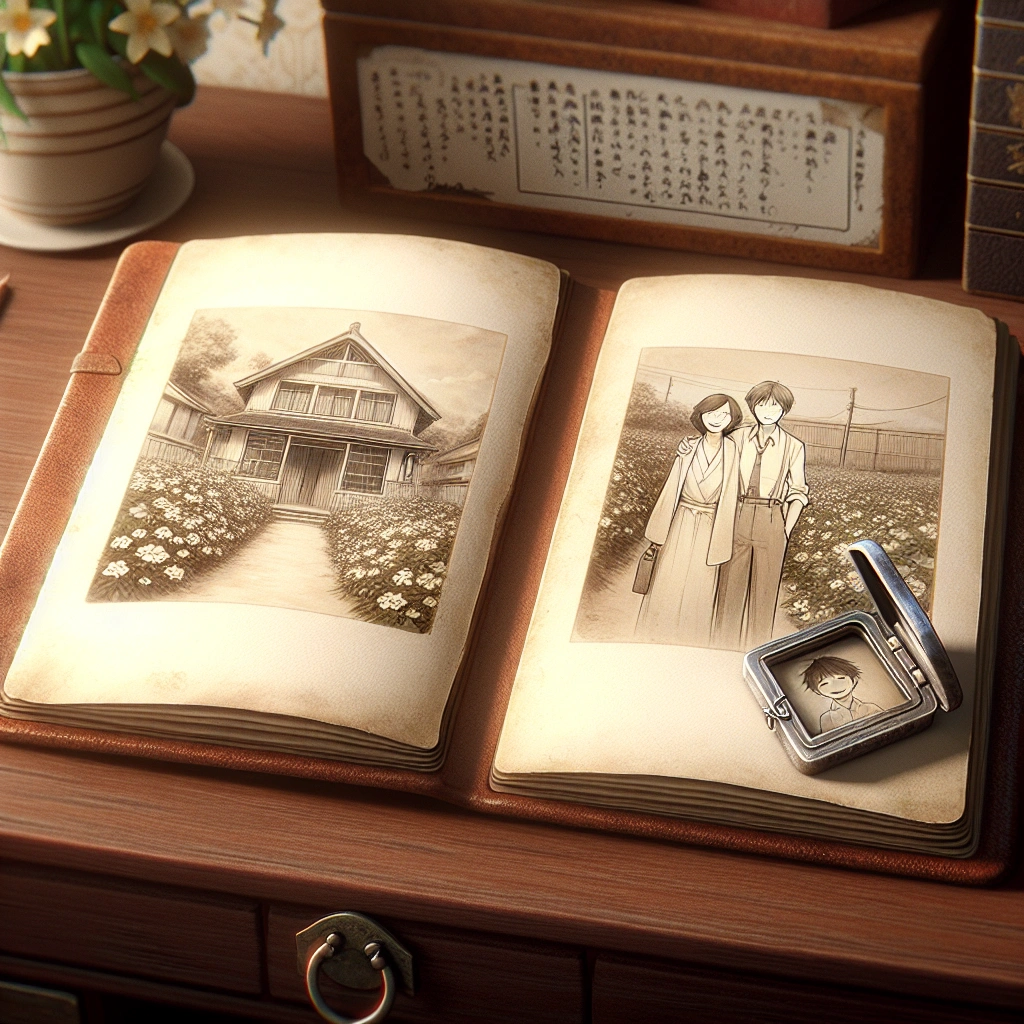Short Answer for What Happened to Kotaro’s Parents?
Kotaro’s mother abandoned the family and later died from an unknown cause, and Kotaro’s father could not keep the family together, leading Kotaro to live independently.
Imagine feeling the ground beneath your feet vanish, leaving you suspended in a void of uncertainty and loneliness. This is the reality for Kotaro, a young boy navigating the turbulence of life without the anchors of parental support. “resilience.
Kotaro’s mother, a shadow in his past, left the family, later succumbing to an unknown cause. Her departure set the stage for a series of events that would forever alter Kotaro’s path, leaving him to wrestle with feelings of rejection and sorrow. The mystery surrounding her actions and her untimely demise compounds the complexities of Kotaro’s journey.
His father, unable to mend the fractures within the family, drifted away, pushing Kotaro into a premature stand of independence. This narrative isn’t just a recount of absence; it’s a testament to a child’s incredible capacity to adapt and thrive despite the odds. Venture into Kotaro’s world, where the absence of parents unveils a story not just of despair, but of hope and indomitable spirit.
-
Kotaro’s mother abandoned the family and later died from an unknown cause, leaving Kotaro to face profound feelings of loss and rejection.
-
Kotaro’s father, despite some good moments, was not able to maintain their family together, pushing Kotaro towards independence at an early age.
-
Kotaro, displaying an astounding resilience and maturity, chooses to live alone and navigates life with exceptional independence.
-
The absence of his parents plays a significant role in shaping Kotaro’s worldview, interactions, and his precocious behavior.
-
Kotaro’s story, while highlighting abandonment and loss, also emphasizes his resilience, maturity, and strength in facing life’s challenges.

Who Are Kotaro’s Parents?
Kotaro’s parents are enigmatic figures, shrouded in a blend of mystery and tragedy, with their stories only partially revealed. His father, though having shared good moments with Kotaro, ultimately failed to maintain the familial bond, leading to Kotaro’s early quest for independence. His mother is characterized by her absence, having abandoned the family and later dying from unknown causes, forcing Kotaro into a life marked by resilience and maturity beyond his years.
Understanding the background and early life
Kotaro’s parents are a topic of much speculation and intrigue, highly influenced by the young boy’s unique situation and the mysterious circumstances surrounding his family. The materials available, such as a Reddit discussion and insights from GameRant, provide us with fragmented but poignant details about the life Kotaro comes from.
Kotaro’s Father: From the bits and pieces we’ve gathered, Kotaro’s father had his moments of connection with Kotaro. Despite these flashes of good, something went amiss, leading Kotaro to eventually leave. The exact reasons behind this separation or the nature of their relationship remains wrapped in layers of storytelling and speculation. There’s an understanding that he wasn’t able to adequately care for Kotaro, pushing the young boy toward a path of independence far too early.
Kotaro’s Mother: Kotaro’s mother’s absence is shrouded in even more mystery and tragedy. It is known that she abandoned Kotaro and his father at some point before her eventual death from an unknown cause. The exact reasons for her abandonment and the circumstances of her death are not elaborately explained, leaving a gaping hole in Kotaro’s familial backstory.
The journey Kotaro embarks upon is incredibly mature for his tender age. Opting to live alone, he demonstrates astounding resilience and independence.
Yet, this choice roots itself in the young boy’s response to his parents’ absence – an absence deeply felt and at times pointedly addressed through the storyline.
Woven into the narrative are hints and explorations of Kotaro’s past traumatic experiences with his parents. Websites like Reddit and Wikipedia suggest that despite the scarce direct interactions depicted between Kotaro and his parents, the effects of his early life experiences significantly shape his worldview, interactions, and remarkably precocious behavior.
His independence is profound, navigating life with a level of acumen and persistence uncommon in children his age. Kotaro’s journey is not only about survival but demonstrating an unusual capacity to adapt, understand, and grow beyond the shadow of his familial past.
While Kotaro’s story might punctuate the fallout of familial disintegration, it equally heroes the unbeatable spirit of a child navigating life’s complexities head-on.
Kotaro handles life sans parents with a grace and maturity sprawling beyond his years. While what happened to Kotaro’s parents is a tale of abandonment and loss, it is Kotaro’s resilience, maturity, and individual strength that take the front seat, making his story not just one of despair but also of hope and indomitable spirit.
| Aspect | Detail |
|---|---|
| Kotaro’s Father | Known to have had good moments with Kotaro, but ultimately not enough to keep the family together. |
| Kotaro’s Mother | Abandoned the family, later died from an unknown cause. |
| Kotaro’s Response | Chose independence, demonstrating resilience and a mature understanding of his situation. |
Through this lens, Kotaro’s backstory beckons a deeper understanding of resilience in the face of abandonment, highlighting the innate strength within a child to rise above the crumbling structures of familial support.

What Happened to Kotaro’s Parents?
Kotaro’s mother, struggling with her own issues, left him and his father, leading to a murky series of events that ultimately culminated in her death. Meanwhile, Kotaro’s father, overwhelmed by circumstances and possibly his own inability to cope, also became absent from Kotaro’s life. As a result, Kotaro, showcasing an unusual level of maturity for his age, decided to embark on a life of independence, leading him to move into an apartment complex alone.
Tracing the events leading to their fates
In trying to uncover what happened to Kotaro’s parents, we delve into a series that captures hearts with its unique blend of innocence and tragedy. Kotaro Lives Alone is not just a story about a 4-year-old boy braving the world; it’s a poignant narrative about loss, resilience, and the quest for a semblance of family.
Kotaro, the precocious and incredibly self-sufficient protagonist, finds himself in an unconventional living situation for someone his age. Moving into an apartment complex all by himself, this boy is not one to be underestimated.
His neighbors in the complex, from the struggling manga artist Shin Karino to the sprightly Mizuki Akitomo, quickly become intertwined in Kotaro’s life. Through these relationships, the mystery of his family begins to unfurl.
What’s truly heart-wrenching is Kotaro’s history with his parents. His mother, grappling with her own battles, ultimately leaves Kotaro and his father. The reasons are murky, but the outcomes, devastating. Her departure from his life and subsequent death leave an indelible mark on Kotaro. But the tale doesn’t end there. Kotaro’s father, engulfed by circumstances and perhaps his inability to cope, ceases to be a part of Kotaro’s life.
The result? A young boy who, with an almost otherworldly maturity, decides to embark on a life of independence. This decision leads him to the steps of the apartment complex, bringing us to the narrative’s present. Kotaro’s decision to live alone stemmed from a series of events that would tear at the heartstrings of even the most stoic individuals. This wasn’t just a child acting out; this was survival.
But Kotaro’s story is not a mere tableau of sorrow. Within the layers of his experience are resilience, the search for belonging, and an unyielding spirit.
The child’s interaction with his neighbors paints a vivid picture of found family. Their quirks, troubles, and interactions with Kotaro provide a backdrop for healing, laughter, and the construction of a peculiar yet heartwarming community.
So, when asked what happened to Kotaro’s parents, the answer is multifold. It’s a tale of loss, abandonment, but above all, a narrative about a child’s incredible resilience in the face of despair.
Kotaro’s life, though marked by the absence of his parents, is also defined by the new connections he forms – making his story one of hope amidst adversity.
In wrapping up, Kotaro Lives Alone is a masterpiece that deals with heavy themes through the lens of a child’s innocence. It encourages viewers to look beyond the surface and understand the profound impacts of adult decisions on young lives. For those intrigued by Kotaro’s journey and the events that shaped him, diving into the series will be a profoundly touching experience.

Kotaro Lives Alone Summary: Get Ready for Season 2!
“Kotaro Lives Alone” introduces us to a resilient and independent 4-year-old boy, Kotaro, who intriguingly lives by himself after enduring neglect from a mother and abuse by a father, leading him to fend on his own in a less-than-perfect world. In Season 1, Kotaro begins to heal from his past traumas through his relationship with his neighbor Shin Karino, a striving manga artist, showcasing his journey of self-reliance and opening up to connections that begin to mend his deep-seated wounds. As we eagerly await Season 2, the development and revelations regarding Kotaro’s parents and their impact on his character promise to delve deeper into his healing process, bringing us a story filled with heart, humor, and the untold details of his past, making it a highly anticipated continuation.
Recap of Kotaro’s journey and the impact of his parents’ story
Folks, let me tell you, Kotaro’s journey is nothing short of incredible, just like how we made America great. In Season 1, this little guy, Kotaro, only 4 years old, moves into an apartment by himself, can you believe it? Living alone, folks. But it’s not just about living alone. It’s a tremendous story about bravery, resilience, and the human spirit, the best, really.
Now, about what happened to Kotaro’s parents – the story there, it’s huge, hugely sad. Kotaro’s journey takes a very interesting turn because of his backstory. His mother was neglectful, folks. And his father? Abusive. The worst kind of person, really. They left Kotaro to fend for himself in a world that’s, let’s say, less than perfect. But this boy, Kotaro, he’s tough, tougher than many out there. He’s making it on his own, learning the ropes of life with a resilience that’d put many to shame, the tip-top kind of resilience.
Season 2? Well, we’re all eagerly waiting, like waiting for the next big, yuge deal.
It’s gonna be tremendous. The end of Season 1 left us with a kind of cliffhanger, you know.
Kotaro, this phenomenal kid, has started to open up, showing signs of healing, bonding with his neighbor Shin Karino, a manga artist, not the most successful one, but hey, he’s getting there. Together, they’ve started to uncover and heal the wounds left by his parents’ neglect and abuse.
It’s all about coming back stronger, and Season 2 is poised to take us deeper into Kotaro’s healing journey and his adventures in self-reliance and forging connections despite his initial solitude.
The burning question that keeps us on our toes, waiting like on election night, is how the revelations and developments regarding his parents will shape Kotaro. What happened to Kotaro’s parents is not just a backstory; it’s a pivotal part of his character development.
It’s like when you figure out the art of the deal, folks. It’s crucial, big-league crucial.
So, get ready for Season 2. It’s going to be fantastic, the best season yet, with heart, humor, and maybe, just maybe, a bit more light shed on what happened to Kotaro’s parents. Stay tuned. It’s going to be yuge.

The Fate of His Parents
The tragic story of Kotaro’s parents begins with his mother’s painful decision to abandon him due to inner turmoil and emotional struggles, leading her to a path that ultimately resulted in her untimely death. The mystery surrounding his father’s whereabouts was eventually resolved, but instead of reuniting the family, it led to Kotaro being moved into a foster care facility, emphasizing the complexity and sadness of his early life experiences. This sequence of events underlines the profound impact of parental decisions on a child’s life, drawing attention to the emotional and legal challenges encountered during transitions within the child welfare system.
Details on the mother’s abandonment and subsequent death
The story of Kotaro’s parents is both tragic and compelling, like something straight out of a movie, but believe me, it’s all too real. His mother, after years of struggle and emotional turmoil, made a heart-wrenching decision to abandon Kotaro. It’s a devastating thing, truly sad. Kotaro was left to navigate the world without her, dealing with feelings of rejection and worthlessness that would bring anybody down. It’s unfortunate, but it happens, folks. Later, his mother’s life took a darker turn, leading to her untimely demise. You can read about how children deal with such emotions here.
The father’s location discovery and Kotaro’s move to a foster facility
As for his father, well, it’s another complicated piece of the puzzle. For years, his whereabouts were a mystery, top-level secret stuff. Discovering a missing parent involves an intense investigation, much like a detective novel but with more paperwork. State and Territory police take the lead, doing a fantastic job, really, in managing and investigating a missing person’s case. You can find more about this process here.
Once his father was finally found, it sadly didn’t lead to a family reunion. Instead, Kotaro was moved to a foster facility. The move itself involves a complex legal process, almost like negotiating a business deal, but with human lives. It’s intricate work, ensuring the child’s safety and continuity of care. This transition from one house to another is a carefully managed process, involving legal documentation, searching for the legal owner of records, and ensuring any liabilities are clearly outlined. Interested parties can dive deeper into the nuances of such a move here.
It’s crucial for those involved in foster care to know how to explain such moves to a child, ensuring they understand the process and what to expect. Proper communication can significantly ease the transition, making it less daunting for the child. Guidance on this can be found here.
| Key Aspects | Details |
|---|---|
| Mother’s Abandonment & Death | Kotaro deals with complex emotions, leading to an understanding of his worth. |
| Father’s Discovery & Foster Transition | The legal and emotional process involved in moving Kotaro to foster care is meticulously handled. |
Kotaro’s journey through these tumultuous events is a story of resilience. It’s a lot to process, a lot to navigate, but it tells you something about the human spirit.
It’s incredible, really. Unpack more on these topics with the provided links, offering a deeper dive into the emotional and legal aspects that shaped Kotaro’s life and moved him towards his future.

Reception
The reception to the storyline about Kotaro’s parents has been profoundly impactful, resonating deeply with its viewers and sparking significant conversations. It not only touched the hearts of the audience emotionally, bringing tears and empathy to the forefront, but also engaged them intellectually by opening up critical discussions on the complexities of parenting, the role of media in family dynamics, and the psychosocial effects of loss and resilience. This wide-ranging reception highlights the storyline’s capacity to unite viewers across various demographics through shared human experiences, fostering a rich interpretive diversity and underscoring the transformative power of storytelling in both education and inspiration.
Analyzing audience reactions and interpretations of the parental storyline
The storyline surrounding what happened to Kotaro’s parents Hope. Here’s a step-by-step analysis of how this narrative has captured the imagination and hearts of its viewers.
First, let’s dive into the emotional impact this storyline had. The reveal about Kotaro’s parents not only served as a pivotal plot twist but also as a moment of profound narrative depth. Viewers found themselves deeply moved, with many reaching for the nearest box of tissues. This storyline didn’t just tell a story; it let us feel the story, embodying the idea that the most engaging stories are about people-or in this instance, characters that we accord deep, human psychological attributes (reference).
The storyline also raised significant discussions about parenting and parental absence. In exploring what happened to Kotaro’s parents, the narrative opened up dialogues about the complexities of parenthood, the impact of loss on both children and parents, and how these themes resonate with real-life hardships. Such discussions parallel studies that highlight the crucial role of parental mediation in shaping children’s perceptions of media content (PDF reference).
Furthermore, this narrative arc prompted viewers to consider the effect of media on audiences, especially children. As the storyline of Kotaro’s parents unfolded, it became a prime example of the spoken and unspoken ways that screen media narrates and influences the dynamics of parent-child interactions (source).
Another intriguing aspect of the reception has been the analysis of audience empathy. The storyline, by presenting a child’s journey through grief and resilience, tapped into universal sentiments of compassion and empathy, resonating across demographic boundaries. It truly exemplified how potent storytelling can unite disparate audiences through shared human experiences.
Let’s consider the interpretive diversity the storyline elicited. Different viewers extracted varied meanings from what happened to Kotaro’s parents, reflecting a wide spectrum of cultural, societal, and personal perspectives. This narrative elasticity underscores the power of media to engage, provoke thought, and foster a rich tapestry of interpretations (source regarding media interpretations).
Additionally, the reception shed light on the transformative power of storytelling. Kotaro’s journey catalyzed discussions about overcoming adversity, the importance of community in healing, and the unbreakable bonds that can form in the face of shared loss. These discussions align with broader societal conversations about resilience and recovery, proving that stories like these do more than entertain; they educate and inspire (source regarding storytelling power).
Finally, analyzing the reception of Kotaro’s parental storyline, we can’t overlook the psychosocial impact. The narrative has played a role in validating viewers’ personal experiences with loss, offering comfort, or even catharsis, through its portrayal. It’s a brilliant demonstration of how narratives that delve into complex emotions and human conditions can foster a sense of shared humanity and understanding (source on media’s impact on psychosocial aspects).
The reception to the storyline about what happened to Kotaro’s parents illustrates the profound impact a well-crafted narrative can have on its audience. It’s a testament to the power of storytelling to evoke emotion, prompt reflection, foster empathy, and ultimately, connect us all a little closer through the universal language of the human experience.
| Aspect | Details | Impact/Interpretation |
|---|---|---|
| Emotional Impact | The reveal about Kotaro’s parents was a pivotal plot twist | Viewers were deeply moved, embodying deeply human psychological attributes |
| Parenting Discussions | Narrative explored complexities of parenthood and impact of loss | Opened up dialogues about parenthood, paralleling studies on parental mediation in media content perception |
| Media’s Role | Storyline influenced dynamics of parent-child interactions | Highlighted the spoken and unspoken ways media narrates and influences these dynamics |
| Audience Empathy | Presented a child’s journey through grief and resilience | Tapped into universal sentiments of compassion, resonating across demographics |
| Interpretive Diversity | Different meanings extracted, reflecting cultural and personal perspectives | Illustrated media’s power to engage and provoke thought, fostering a rich tapestry of interpretations |
| Transformative Power of Storytelling | Kotaro’s journey initiated discussions on overcoming adversity and the importance of community | Aligned with societal conversations about resilience, showing stories educate and inspire |
| Psychosocial Impact | The narrative validated viewers’ experiences with loss, offering comfort or catharsis | Shows how narratives can foster a sense of shared humanity and understanding |
Conclusion
what happened to Kotaro’s parents is a tale of tragedy and abandonment that plays a crucial role in shaping the young boy’s life and resilience. Kotaro’s mother abandoned the family because of her struggles, and her subsequent death added layers of complexity and sorrow to Kotaro’s story. Kotaro’s father, unable to provide the care and support needed, eventually became absent from Kotaro’s life, compelling the boy to embrace independence at a remarkably young age.
This background serves as the foundation for Kotaro’s journey, illustrating how absence and loss can deeply affect a child, yet also highlight the indomitable spirit and resilience of such a young individual. The experiences with his parents have forced Kotaro into a life of solitude, but they also carved a path for his mature understanding of the world and his quest for a new sense of family and belonging.
Kotaro’s story is not just about the sadness rooted in his parents’ fate but is a powerful narrative of overcoming adversity. Despite the heavy odds stacked against him from such an early age, Kotaro demonstrates that strength, resilience, and hope can emerge from the direst of circumstances. His ability to navigate life, seek out connections, and grow beyond the shadows of his familial past underscores a poignant message of endurance and hope amidst adversity.
